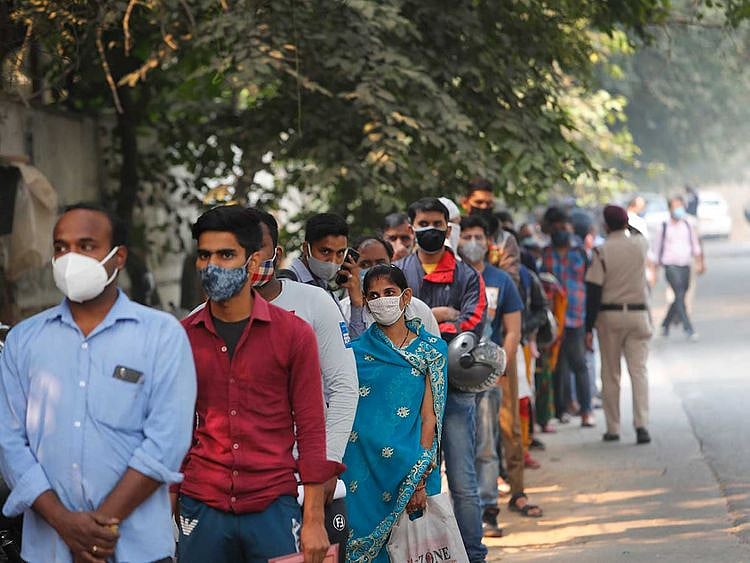Why is COVID-19 variant Omicron spreading so fast?
Omicron is now dubbed the 'great evade artist' due to its ability to escape immunity

Highlights
- How does Omicron spread so fast?
- A high viral load isn’t the answer, study shows
- However, Omicron brings some “unexpected advantages”, says expert
Why is COVID-19 variant Omicron hyper-transmissible? Scientists seem to have found the answer. Lab studies are piling up confirming Omicron is so much more transmissible and has quickly overtaken Delta in many countries.
But it's not due to the suspected intrinsic higher viral load caused by Omicron, stated virologist Alex Sigal of the Africa Health Research Institute in Durban, South Africa.
What are these 'unexpected advantages'?
One study, published earlier this month by a Danish team, has confirmed that Omicron is much better at evading immunity compared to Delta. Now, a new study shows infection with Omicron actually brings some “unexpected advantages”.
“At the population level, we are seeing milder disease during the Omicron wave of the SARS-CoV-2 pandemic,” Sigal stated in an article published in the journal Nature Reviews Immunology on Wednesday (January 19, 2022).
“The Omicron variant of SARS-CoV-2 escapes immunity generated by vaccines and previous infections — yet seems to have some unexpected advantages over the other variants we have experienced so far.”
Cross-protective immunity
Citing population data from the National Institute for Communicable Diseases in South Africa from July 2020 till mid-January 2022, he pointed to “strong evidence” that the disease induced by Omicron infection is “considerably milder at the population level”.
But more importantly, Sigal noted that infection with Omicron has been shown to trigger cross-protective immunity to the more pathogenic (causing more severe disease) — Delta variant.
WHAT IS CROSS-PROTECTIVE IMMUNITY?
▶ Cross-protective immunity, in the case of COVID-19, refers to the protection against SARS-CoV-2 infection due to the pre-existing adaptive immunity developed from the past exposure to another coronavirus. ▶ There is emerging evidence that immunity conferred by Omicron infection can protect individuals from COVID-19 caused by Delta.
What is the real score with 'milder' Omicron?
Is Omicron infection really “milder" than Delta, or have the populations that Omicron is infecting built up enough immunity so that the disease course will be milder with any variant of SARS-CoV-2?
Sigal cites data supporting both scenarios.
“Lower viral pathogenicity and higher population immunity do not have to exclude one another. Most likely, both play a part in what is by now clear: Omicron leads to less severe disease at the population level,” he stated.
Hospitalisation and death rates caused by Omicron infections in numerous countries appear to show that it causes less severe disease, but is highly efficient in infecting people.
If Omicon dominates, is Delta on the path to extinction?
Omicron, first identified in South African, has now overtaken other SARS-CoV-2 variants like a lightning, becoming the dominant strain. Several studies show Omicron has achieved “success” despite causing viral levels in the body that are similar to — or lower than — those of its main competitor, the Delta variant.
Omicron’s advantage in transmissibility “may set Delta on the path to extinction”, wrote Sigal, who is also affiliated with the School of Laboratory Medicine and Medical Sciences, University of KwaZulu-Natal in Durban, South Africa and the Max Planck Institute for Infection Biology in Berlin, Germany.
What is the probability of another variant of concern emerging?
The emergence of another major variant of concern (VOC) is “highly probable”, Sigal said, noting the virus’ proven ability to evolve to escape immunity in the current climate of infection.
If that is so, what kind of SARS-CoV-2 variant will we get next?
Sigal points to one of the well-documented ways in which immune-escape variants have been found to evolve: in people who cannot clear the virus because of “immunosuppression".
WHAT IS IMMUNOSUPPRESSION?
▶ It means having a weakened immune system. People who are immunosuppressed have a reduced ability to fight infections and other diseases. ▶ This may be caused by certain diseases or conditions, such as AIDS, cancer, diabetes, malnutrition, and certain genetic disorders. ▶ Immunosuppression is relatively common in Africa and elsewhere in a subset of people with advanced HIV disease, where poorly suppressed HIV infection over many years leads to severe damage to the immune response.
Immunosuppression is known to leads to a prolonged infection where — in some cases — there are trace levels of anti-SARS-CoV-2 antibody that are not sufficient to clear the virus, but that possibly provide selective pressure for the virus to evolve antibody-escape mutations.
Do booster shots really protect?
Yes, according to experts. That Omicron is hyper transmissible is borne by numerous research: a UK team noted a 16-fold higher “risk of reinfection” during the Omicron wave than during the Delta wave.
The findings, contained in technical brief published by the UK Health Security Agency on January 14, 2022, also noted that vaccinated people who are “boosted” had up to 90% less risk of being hospitalised with Omicron. On the other hand, vaccinated people without a booster had 44% less risk of hospitalisation.
Network Links
GN StoreDownload our app
© Al Nisr Publishing LLC 2026. All rights reserved.